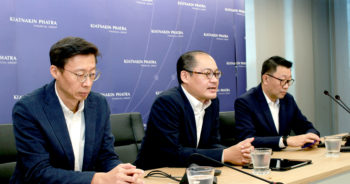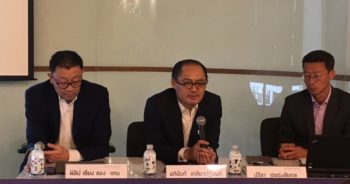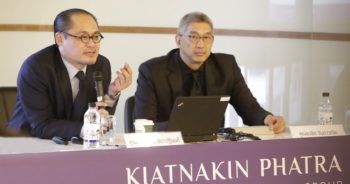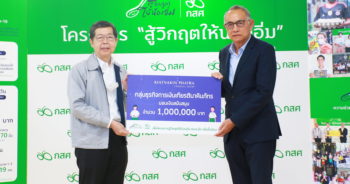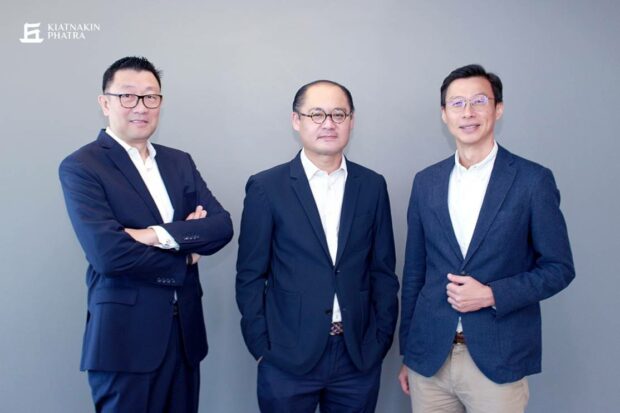
(3 สิงหาคม 2565) กลุ่มธุรกิจการเงินเกียรตินาคินภัทร(KKP) แถลงผลประกอบการครึ่งปีแรก 2565 ดีต่อเนื่อง โดยหลักมาจากธุรกิจธนาคารพาณิชย์ สินเชื่อเติบโตร้อยละ 10 จากเมื่อสิ้นปี 2564 โดยเฉพาะในกลุ่มสินเชื่อเช่าซื้อรถยนต์ สินเชื่อที่อยู่อาศัยสำหรับรายย่อยที่รองรับความต้องการจากกลุ่มลูกค้าที่มีศักยภาพในภาวะเศรษฐกิจชะลอตัวที่ผ่านมา อย่างไรก็ตาม มุมมองต่อสถานการณ์เศรษฐกิจที่ยังคงมีความเสี่ยงในเรื่องเงินเฟ้อ อัตราดอกเบี้ย ตลอดจนภาวะหนี้ครัวเรือนอยู่ในระดับสูง ทำให้ในครึ่งปีหลัง 2565 กลุ่มธุรกิจฯ มุ่งเติบโตแบบมีกลยุทธ์ ต่อยอดศักยภาพธุรกิจที่มีความชำนาญผ่านเทคโนโลยี โดยไม่ละเลยการเตรียมการช่วยเหลือลูกค้าที่อาจยังได้รับผลกระทบจากเศรษฐกิจซบเซาต่อเนื่อง ทั้งนี้ กลุ่มธุรกิจฯ มีกำไรสุทธิ 4,089 ล้านบาท เพิ่มขึ้นร้อยละ 45.1 เมื่อเทียบกับปี 2564
นายอภินันท์ เกลียวปฏินนท์ ประธานเจ้าหน้าที่บริหาร กลุ่มธุรกิจการเงินเกียรตินาคินภัทร เปิดเผยว่า “ผลประกอบการของกลุ่มธุรกิจการเงินเกียรตินาคินภัทรครึ่งปีแรก 2565 อยู่ในเกณฑ์ดีอย่างต่อเนื่อง ธุรกิจสินเชื่อธนาคารพาณิชย์โดยเฉพาะอย่างยิ่งในส่วนของสินเชื่อเช่าซื้อ และสินเชื่อที่อยู่อาศัย โดยสินเชื่อรวมขยายตัวถึงร้อยละ 10 ด้านธุรกิจตลาดทุน รายได้กระจายตัวตามลักษณะธุรกิจ โดยธุรกิจนายหน้ายังคงครองส่วนแบ่งอันดับหนึ่งของตลาดที่ร้อยละ 18.18 และธุรกิจการลงทุนเติบโตดีจากฝ่ายค้าหลักทรัพย์และสัญญาซื้อขายล่วงหน้า (Equity and Derivative Trading) ที่ทำกำไรได้ดีในสภาวะผันผันผวน ด้านวานิชธนกิจมีจำนวนธุรกรรมลดลงในช่วงต้นปี แต่ยังคงมีธุรกรรมขนาดใหญ่หลายรายการในช่วงครึ่งหลังของปี ในขณะที่ธุรกิจที่ปรึกษาการลงทุนส่วนบุคคล (Wealth Management) มีปริมาณทรัพย์สินภายใต้คำแนะนำ (Asset Under Advice, AUA) อยู่ที่กว่า 7 แสนล้านบาท ทั้งนี้ ธนาคารได้ปรับลดการตั้งสำรองสอดรับกับคุณภาพที่ดีของพอร์ตสินเชื่อใหม่ และอัตราการชำระคืนของลูกหนี้ดีกว่าที่คาดการณ์ โดยตั้งสำรองเป็นจำนวน 1,878 ล้านบาท ลดลงกว่าปีก่อนหน้านี้ค่อนข้างมาก
สำหรับแนวทางการดำเนินธุรกิจในระยะต่อไป กลุ่มธุรกิจฯ ยังคงต่อยอดการประสานธุรกิจธนาคารพาณิชย์และตลาดทุน เพื่อพัฒนาบริการที่ครบถ้วนและไร้รอยต่อสำหรับลูกค้า ตลอดจนกระจายแหล่งรายได้รองรับสถานการณ์เศรษฐกิจที่อาจทวีความผันผวนในอนาคต โดยกลุ่มธุรกิจฯ มุ่งเน้นการใช้ประโยชน์จากพัฒนาการทางเทคโนโลยีและโครงสร้างพื้นฐานทางการเงินของประเทศ ที่ลดข้อจำกัดด้านขนาดหรือเครือข่ายและทำให้ธนาคารแข่งขันได้อย่างเท่าเทียม อาทิ ธุรกิจ KKP Edge ที่นำเสนอบริการ Wealth Management ในแบบที่เข้าถึงกลุ่มลูกค้าในวงกว้างมากยิ่งขึ้น หรือธุรกิจ Dime ที่กำลังจะเปิดตัวผลิตภัณฑ์และบริการในรูปแบบ Digital ในเร็วๆ นี้ พร้อมกันนั้น กลุ่มธุรกิจฯ ยังคงไม่ละเลยการลงทุนในด้านระบบสำหรับธุรกิจหลักอย่างสินเชื่อที่กลุ่มธุรกิจฯ เชื่อว่ายังมีศักยภาพสำหรับการเติบโตและเป็นองค์ประกอบสำคัญในธุรกิจ โดยสำหรับทั้งปีนี้ กลุ่มธุรกิจฯ มีเป้าการเติบโตของสินเชื่อรวมร้อยละ 16
อย่างไรก็ตาม กลุ่มธุรกิจฯ มองว่าสถานการณ์แนวโน้มเศรษฐกิจในภาพรวมยังน่ากังวลจากภาวะเงินเฟ้อ อัตราดอกเบี้ย ผนวกกับภาวะปัญหาหนี้ครัวเรือนอยู่ในระดับสูง กลุ่มธุรกิจฯ จึงเตรียมพร้อมสำหรับช่วยเหลือลูกค้าที่อาจได้รับผลกระทบจากเศรษฐกิจซบเซาต่อเนื่องมาจากสถานการณ์โควิด ทั้งนี้ โดยมุ่งให้การช่วยเหลือเป็นไปอย่างยั่งยืน มากกว่ามาตรการเฉพาะหน้า เพื่อให้เป็นประโยชน์สูงสุดต่อลูกค้าในภาวะเศรษฐกิจตกต่ำต่อเนื่อง”
นายฟิลิป เชียง ชอง แทน กรรมการผู้จัดการใหญ่ ธนาคารเกียรตินาคินภัทร จำกัด (มหาชน) ให้รายละเอียดในส่วนของธนาคารพาณิชย์ว่า “สำหรับระยะที่ผ่านมา นโยบายการเติบโตสินเชื่อแบบมีกลยุทธ์ (Smart Growth) นั้นให้ผลที่ดี โดยช่วยให้ธนาคารสามารถรักษาการเติบโตของรายได้และกำไรแม้ในสถานการณ์เศรษฐกิจชะลอตัว และในขณะเดียวกัน มาตรการคัดกรองและบริหารความเสี่ยงที่มีประสิทธิภาพยังรักษาคุณภาพของสินเชื่อให้อยู่ในระดับที่เหมาะสม โดยสินเชื่อของธนาคารครึ่งปีแรก 2565 มีรายได้ที่มาจากดอกเบี้ยถึงร้อยละ 69 โดยหลักมาจากกลุ่มสินเชื่อรายย่อยที่มีหลักประกัน ไม่ว่าสินเชื่อเช่าซื้อรถยนต์ที่โตขึ้นกว่าร้อยละ 11 หรือสินเชื่อเพื่อที่อยู่อาศัยที่โตขึ้นร้อยละ 19
สำหรับแนวทางการดำเนินธุรกิจในระยะต่อไป ธนาคายังคงต่อยอดจากธุรกิจที่มีความชำนาญ ไม่ว่าการปรับปรุงระบบและกระบวนการภายในเพื่อการพิจารณาสินเชื่อที่มีประสิทธิภาพมากขึ้นและเข้าถึงผู้บริโภคได้สะดวกง่ายดายยิ่งขึ้นผ่านแอป KKP Mobile การเดินหน้าผลิตภัณฑ์ใหม่อย่างสินเชื่อ ‘รถเรียกเงิน’ รวมทั้งการขยายเครือข่ายการให้บริการผ่านการสร้างความร่วมมือกับคู่ค้าที่มีความแข็งแกร่ง นอกจากนั้น เพื่อเป็นส่วนหนึ่งของการบรรเทาปัญหาหนี้ภาคครัวเรือนที่อยู่ในระดับสูง และสนับสนุนการเติบโตอย่างยั่งยืน ธนาคารยังมุ่งเสริมสร้างความแข็งแรงทางการเงินให้กับลูกค้าผ่านการเชื่อมโยงบริการธนาคารเข้ากับบริการด้านการลงทุนที่เป็นความชำนาญของกลุ่มธุรกิจฯ มากขึ้นเรื่อยๆ”
ด้านนายปรีชา เตชรุ่งชัยกุล ประธานสายการเงินและงบประมาณ ธนาคารเกียรตินาคินภัทร จำกัด (มหาชน) ได้ให้รายละเอียดเกี่ยวข้อมูลทางการเงินของผลการดำเนินงานครึ่งปีแรก 2565 ว่า “กลุ่มธุรกิจฯ มีกำไรสุทธิเท่ากับ 4,089 ล้านบาท เพิ่มขึ้นร้อยละ 45.1 โดยเป็นกำไรสุทธิของธุรกิจตลาดทุน จำนวน 672 ล้านบาท ในส่วนของการตั้งสำรองสำหรับครึ่งแรกของปี 2565 ปรับลดลงตามคุณภาพของสินเชื่อที่ยังคงอยู่ในระดับที่บริหารจัดการได้ดี โดยมีอัตราส่วนสำรองต่อสินเชื่อที่มีการด้อยค่าด้านเครดิตอยู่ที่ร้อยละ 169.1 นอกจากนี้ ธนาคารมีรายได้เพิ่มขึ้นทั้งในส่วนของรายได้ดอกเบี้ยสุทธิรวมถึงรายได้ที่มิใช่ดอกเบี้ย โดยรายได้ดอกเบี้ยสุทธิมีจำนวน 8,779 ล้านบาท ปรับเพิ่มขึ้นร้อยละ 15.1 ในขณะที่รายได้ที่มิใช่ดอกเบี้ยมีจำนวน 3,809 ล้านบาท เพิ่มขึ้นร้อยละ 2.2 จากครึ่งปีแรก 2564 และธนาคารมีอัตราส่วนเงินกองทุนทั้งสิ้นต่อสินทรัพย์เสี่ยง (BIS Ratio)คำนวณตามเกณฑ์ Basel III ซึ่งรวมกำไรถึงถึงสิ้นไตรมาส 2/2565 อยู่ที่ร้อยละ 16.56 และอัตราส่วนเงินกองทุนชั้นที่ 1 จะเท่ากับร้อยละ 12.99”
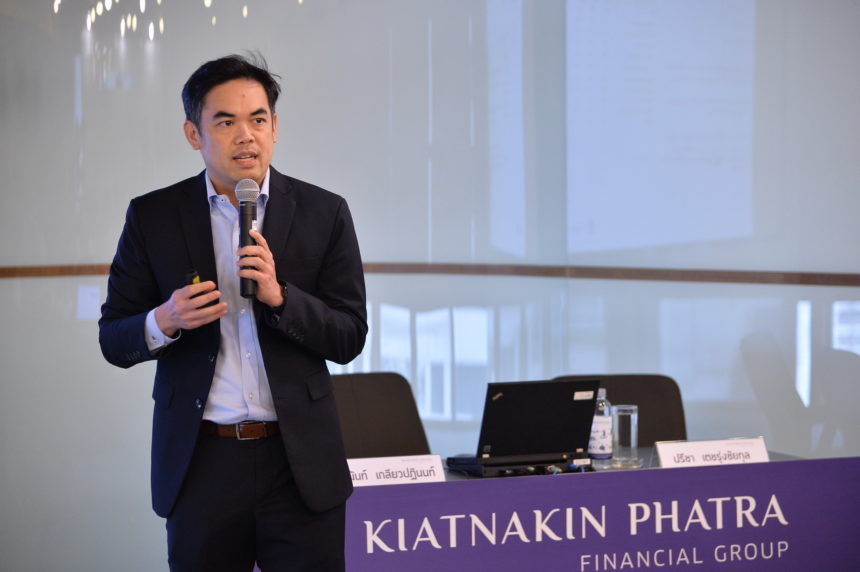
เตือนศก.ไทยเข้าสู่ ‘จักรวาลคู่ขนาน’ เงินเฟ้อ-ดบ. และโลกาภิวัตน์เปลี่ยนโฉมสิ้นเชิง
ดร.พิพัฒน์ เหลืองนฤมิตชัย หัวหน้านักเศรษฐศาสตร์ KKP Research บริษัทหลักทรัพย์ เกียรตินาคินภัทร จำกัด (มหาชน) กล่าวว่า สถานการณ์แวดล้อมด้านเศรษฐกิจในช่วงที่ผ่านมา เปลี่ยนไปอย่างมาก จนอาจเปรียบเทียบได้กับการเข้าไปในอีกจักรวาลคู่ขนาน ไม่ว่าจะเป็นกระแสโลกาภิวัตน์ที่กำลังเปลี่ยนไป ความขัดแย้งด้านการเมืองระหว่างประเทศที่มีมากขึ้นจนมีผลกระทบต่อเศรษฐกิจและห่วงโซ่อุปทานโลก การเปลี่ยนผ่านจากภาวะเงินเฟ้อต่ำสู่ภาวะเงินเฟ้อสูง และภาวะดอกเบี้ยต่ำต่อเนื่องกำลังเปลี่ยนผ่านสู่ยุคดอกเบี้ยขาขึ้น ซึ่งนับเป็นความท้าทายของเศรษฐกิจโลกและไทยทั้งในระยะสั้นและระยะยาว
สำหรับปีนี้ KKP Research ประเมินว่าเศรษฐกิจกำลังค่อยๆ ฟื้นตัวจากฐานที่ต่ำ โดยคาดว่า GDP จะเติบโตได้ 3.3% จากการฟื้นตัวของการบริโภคและการลงทุนภายในประเทศที่เริ่มกลับเข้าสู่ภาวะปกติ การขยายตัวของการส่งออกที่ฟื้นตัวตามเศรษฐกิจโลก การท่องเที่ยวที่กลับมามากกว่าที่คาด และรายได้ภาคเกษตรที่ปรับตัวดีขึ้นตามราคาน้ำมันและสินค้าโภคภัณฑ์ที่เพิ่มขึ้น
อย่างไรก็ดี การฟื้นตัวของเศรษฐกิจไทย มีความน่ากังวลหลายประเด็น โดยเฉพาะอย่างยิ่งการฟื้นตัวที่ไม่ทั่วถึงอย่างชัดเจน และหลายภาคเศรษฐกิจยังไม่กลับไประดับก่อนเกิดปัญหาโควิด นอกจากนี้ เศรษฐกิจไทยกำลังเจอความเสี่ยงจากแรงกดดันเงินเฟ้อและค่าครองชีพที่ปรับขึ้นตัวสูงขึ้น ในขณะที่รายได้และเศรษฐกิจที่ยังฟื้นตัวไม่เต็มที่ และแนวโน้มอัตราดอกเบี้ยที่กำลังปรับตัวเป็นขาขึ้นตามแรงกดดันเงินเฟ้อ การปรับขึ้นอัตราดอกเบี้ยของธนาคารกลางทั่วโลก และความเสี่ยงที่เศรษฐกิจโลกอาจจะเข้าสู่ภาวะชะลอตัวหรือถดถอยในระยะเวลาข้างหน้าจนกระทบต่อการฟื้นตัวของเศรษฐกิจไทย
“ช่วงหลายสิบปีที่ผ่านมา เป็นช่วงที่ดอกเบี้ยแนวโน้มปรับลดลงอย่างต่อเนื่อง หลังจากนี้ภาวะดอกเบี้ยต่ำแบบนี้กำลังจะหมดไป แต่การฟื้นตัวของเศรษฐกิจไทยยังมีความเปราะบาง และไม่ทั่วถึง หลายภาคส่วนยังไม่กลับไปจุดเดิมก่อนวิกฤตโควิด และภาคครัวเรือนและธุรกิจยังคงได้รับผลกระทบและมีปัญหาในการจ่ายคืนหนี้ คำถามสำคัญคือเราจะวางแผนกันอย่างไรในโลกใบใหม่นี้” ดร.พิพัฒน์ กล่าว
นอกจากปัจจัยระยะสั้นแล้ว เศรษฐกิจไทยยังเผชิญความท้าทายเชิงโครงสร้างหลายประการ ที่ทำให้เศรษฐกิจไทยโตช้าลงและมีความเสี่ยงที่จะมีความสามารถในการแข่งขันลดลง ในขณะที่ปัจจัยแวดล้อม เช่น พัฒนาด้านเทคโนโลยี กำลังเปลี่ยนไปอย่างรวดเร็ว ดังนั้น ทางออกสำคัญของเศรษฐกิจไทยในโลกยุคใหม่ คือ การปรับโครงสร้างเศรษฐกิจเพื่อเพิ่มความสามารถในการแข่งขัน ซึ่งรวมไปถึงการสนับสนุนการลงทุนเพื่อเพิ่มประสิทธิภาพ การส่งเสริมการวิจัยและพัฒนา การยกระดับคุณภาพการศึกษาและทักษะแรงงาน การเปิดเสรีแรงงานและบริการ การลดการผูกขาด ตลอดจนการเพิ่มคุณภาพสถาบันเศรษฐกิจและการเมืองเพื่อลดความเหลื่อมล้ำด้านโอกาส
…..
KKP’s credit portfolio expands by 10 percent, moving forward with ‘smart growth’ approach during economic volatility
(August 3, 2022) Kiatnakin Phatra Financial Group (KKP) announces performance in the first half of 2022 improved continuously due mainly to commercial banking. Loans grew by 10 percent from the end of 2021, especially in the auto hire purchase and home loan segment which absorbed demand from quality segment from the recent economic downturn. However, the economic outlook still faces inflation risk. Interest rate and household debt remain high. As a result, KKP will continue with ‘smart growth’ approach in the second half of 2022, as it expands businesses through technology while continuing to assist customers affected by prolonged economic stagnation.KKP had a net profit of THB 4,089 million, up by 45.1 percent compared to 2021.
Mr. Aphinant Klewpatinond, Chief Executive Officer, Kiatnakin Phatra Financial Group, revealed that “KKP’s performance in the first half of 2022 improved continuously. Commercial bank loans, especially hire purchase and home loans, grew by 10 percent. In the capital market segment, revenues are diversified across various businesses. Brokerage business retained #1 market share at 18.18 percent, while investment business grew considerably from equity and derivative trading, which made good profits despite volatile conditions. As for investment banking, the number of transactions declined at the beginning of the year, but large transactions are expected in the second-half year. Meanwhile, wealth management business had asset under advice (AUA) of THB 7 hundred billion baht. The bank has reduced its provisions to be in line with the quality of the new credit portfolio. Debtor repayment rate was better than expected, as a provision of THB 1,878 million was set aside, a considerable decrease from the previous year.
KKP will continue to focus on commercial banking and capital markets to develop complete and seamless services for customers and diversify sources of income to prepare for a more volatile future. KKP will leverage the country’s financial technologies and infrastructure that reduce size or network constraints to allow the bank to compete equally with others. For example, KKP Edge that offers wealth management services to a wider range of customers or Dime that is about to launch digital products and services. At the same time, KKP continue investing in systems for its core businesses, such as loans that we believe to have rooms for growth. For this year, we have set a net loan growth target of 16 percent.
However, KKP views that the overall economic outlook is still grim due to inflation, high interest rate, and high household debt. We have thus prepared to assist customers who may be affected by prolonged economic slowdown caused by the COVID-19 pandemic. However, sustainable relief efforts rather than immediate measures will be emphasized in order to best benefit customers during prolonged economic downturn.”
Mr. Philip Chen Chong Tan, President, Kiatnakin Phatra Bank Public Company Limited, further commented on commercial banking that “The smart growth policy has proven to be effective, allowing the bank to achieve revenue and profit growth even in the face of economic slowdowns. Moreover, effective risk screening and management measures helped keep credit quality at an appropriate level. In the first half of 2022, bank loans generated interest income of 69 percent, mainly from secured retail loans, including auto hire purchase loans (up by 11 percent) and home loans (up by 19 percent).
For our next steps, the bank will continue to build on core businesses. We will streamline internal systems and processes to make credit approval more efficient and accessible through the KKP Mobile app, launch new credit products like KKP Auto, and expand the service network through partnerships. In addition, to help alleviate high household debt and support sustainable growth, the bank will strive to empower customers financially by increasingly linking our banking services to investment services.”
Mr. Preecha Techarungchaikul, Head of Finance and Budgeting, Kiatnakin Phatra Bank Public Company Limited, revealed financial information of the first half of 2022 that “KKP had a net profit of THB 4,089 million, up by 45.1 percent. Net profit from the capital markets was THB 672 million. Provision in the first half of 2022 was reduced as loan quality remained at a manageable level, with an NPL coverage ratio of 169.1 percent. Furthermore, the bank saw an increase in both net interest and non-interest incomes. Net interest income amounted to THB 8,779 million, up by 15.1 percent, while non-interest income was THB 3,809 million, up by 2.2 percent from the first half of 2021. The bank had a BIS ratio of 16.56 percent, which was calculated according to the Basel III rules and included profits up to the end of Q2/2022, and Common Equity Tier 1 of 12.99 percent.”
…….
KKP warns Thai economy is entering a “parallel universe” with drastic change in inflation, interest rates, and deglobalization
Dr. Pipat Luengnaruemitchai, Chief Economist, KKP Research, Kiatnakin Phatra Securities Public Company Limited, revealed that the economic environment in the past years has changed greatly that it could be said that it is entering another ‘parallel universe’ marked by by the spree of deglobalization, growing political conflicts affecting the global economy and supply chains, high inflation, and rising interest rates. This is a challenge to the global and Thai economies both in the short term and in the long term.
KKP Research has assessed that the economy will gradually recover from a low base. GDP is expected to grow at 3.3 percent as domestic consumption and investment start to return to normal, export grows with the global economy, tourism revives faster than expected, and agricultural revenues improve with rising oil and commodity prices.
However, the recovery of the Thai economy is still worrying due especially to uneven recovery. Many economic sectors have not yet returned to the pre-COVID-19 state. In addition, the Thai economy is facing the risks from inflationary pressures and rising cost of living while income and economy have not fully recovered. Interest rates are on the way up as a result of inflationary pressures and central banks around the world pushing to raise interest rates. A possible global economic slowdown or recession in the near future may also affect the pace of recovery of the Thai economy.
“Over the past several decades, interest rates have continued to drop. After this, this period of low interest rates is about to end. However, the recovery of the Thai economy is still fragile and uneven. Many sectors have not yet returned to the state before the COVID-19 crisis. Households and businesses are still affected and have trouble paying back their debts. The important question is how do we prepare for this new world.” said Dr. Pipat.
In addition to short-term factors, the Thai economy is facing several structural challenges that hold back the economic growth and put the country at risk of losing competitiveness while environmental factors such as technological development are changing rapidly. Therefore, a solution for the Thai economy in this new world is economic restructuring to increase competitiveness. The country will also need to support investments, promote research and development, upgrade the quality of education and labor skills, liberalize labor and services, reduce monopoly, and improve economic and political institutions to reduce opportunity gap.
